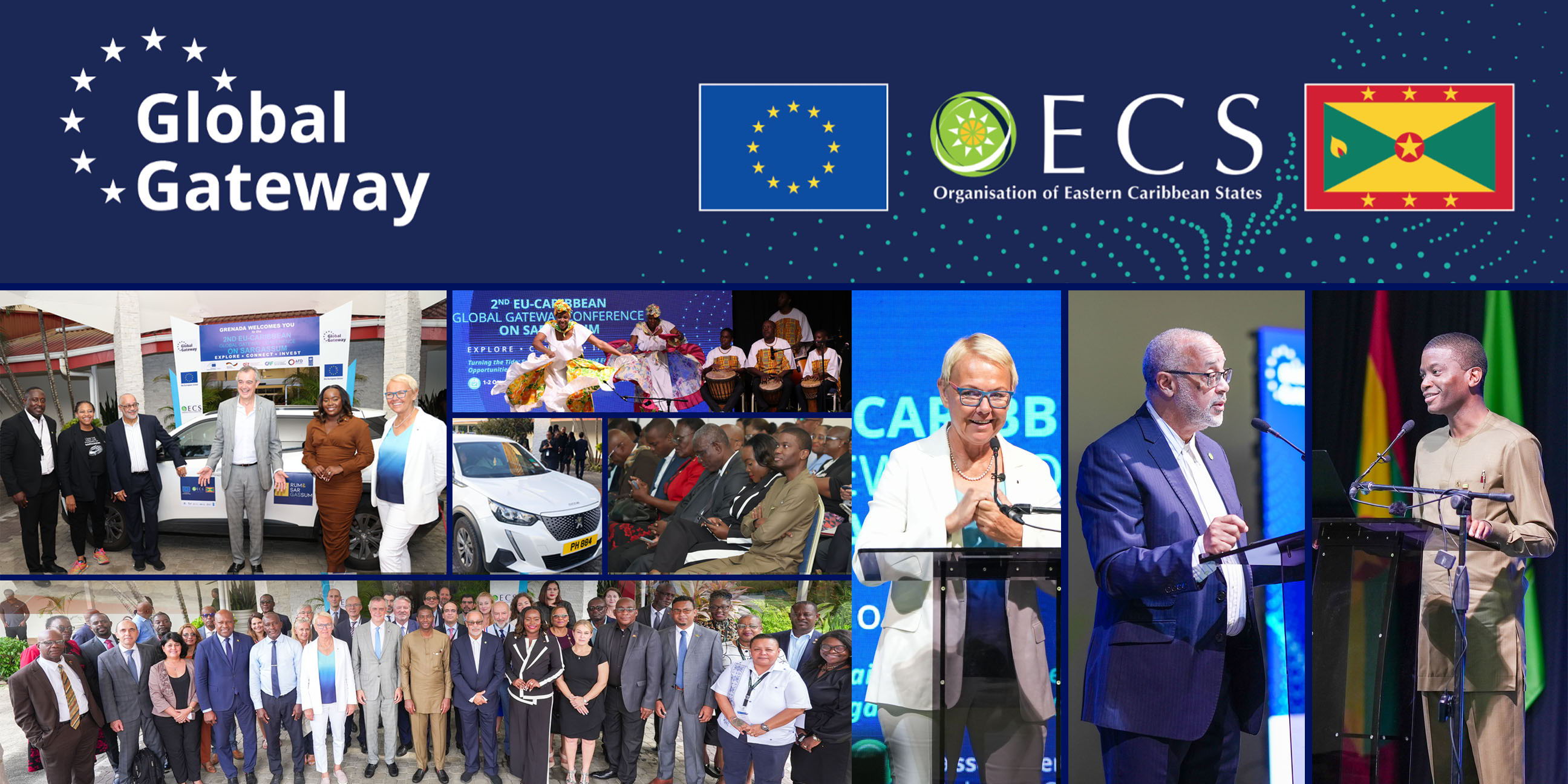EU-Caribbean Conference Brings Together Stakeholders to Enable United Action Against the Sargassum Crisis
Joint Press Release - European Union and the OECS
ST. GEORGE’S, GRENADA – The 2nd EU-Caribbean Global Gateway Conference on Sargassum, convened by the Government of Grenada, the Organisation of Eastern Caribbean States (OECS), and the European Union, concluded with a renewed ambition to collect Sargassum before it reaches the shores to develop sustainable value chains.
In a High-Level Forum co-chaired by the Prime Minister of Grenada, Hon. Dickon Mitchell, the Director General of the OECS, Dr. Didacus Jules, and the Director for Latin America and the Caribbean at the European Commission, Mr. Felix Fernandez-Shaw, representatives of countries from the Caribbean basin underscored the need for urgent collective action to turn Sargassum into an economic opportunity. This includes catalysing research and innovation in a common space, promoting public-private partnerships, and enhancing predictability and forecasting on the availability of Sargassum supply.
The High-Level Forum encouraged the development of national plans for collection and processing, and the harmonisation of strategies and frameworks for Sargassum management across the Caribbean. Creating an adequate enabling environment requires incentives and investments in infrastructure and equipment while developing benefits for local communities in a sustainable manner.
Decision makers are committed to working on viable business models and suitable offshore collection solutions. They committed to leverage investments for critical infrastructure and scaling up operations, promoting joint ventures, transfer of technologies and de-risking operations.
Prime Minister Mitchell said he is determined to start collecting Sargassum at sea by 2026. He added that “the Government of Grenada and the European Union will convene a project team in Grenada before the end of 2024 with stakeholders present at the conference and others interested. They will mobilise plans, human resources infrastructure, and funds to support Grenada in collecting storing, and processing fresh sargassum offshore by 2026”.
European Commissioner for International Partnerships Jutta Urpilainen said:
“Circular economy can turn a threat into an opportunity. Developing sargassum value chains can help address an environmental problem, while creating jobs and growth in the Caribbean and bringing about new bio-based materials. I am glad to see this work picking up and the EU is playing its part through Global Gateway investment strategy.”
OECS Director General Dr. Didacus Jules said:
“The EU has demonstrated a deep commitment to supporting our region, not just through funding but through collaboration and shared learning. This conference is a testament to that partnership, and it is my hope that we will leave here with even stronger ties between the Caribbean and the EU in our joint efforts to tackle this issue.”
Under the theme, ‘Turning the Tide: Sustainable Practices and Economic Opportunities for Sargassum in the Caribbean Basin,’ the two day conference attracted more than 400 regional and international stakeholders from government, private sector, academia, financing institutions, donors and non-governmental organisations.
The aim was to address the environmental and socio-economic impact of Sargassum seaweed across the Caribbean basin and drive dialogue, action and investment in valorisation and the development of value chains at scale, to meet the magnitude of the challenge.
The Conference was held as the Caribbean region continues to grapple annually with unprecedented amounts of Sargassum washing ashore, impacting beaches, disrupting marine ecosystems, and threatening key economic sectors, particularly tourism and fisheries.
Through panel discussions, an investment forum and business-to-business conversations, the Conference led to a greater understanding of the building blocks required to develop sustainable value chains. It explored the latest cutting-edge research, examined monitoring and forecasting, prevention and containment, collection and harvesting, treatment, valorization and use, and disposal of Sargassum biomass.
This conference was an initiative under Global Gateway, the European Union’s strategy to boost investments that generate smart, clean, and secure value chains across the world. The Organisation of Eastern Caribbean States and the Government of Grenada, who co-convened the event, welcomed the collaboration with the European Union in taking up this challenge and effectively turning Sargassum into an economic opportunity for the Caribbean countries and communities.
Danny Moonie
OECS Communications Unit














